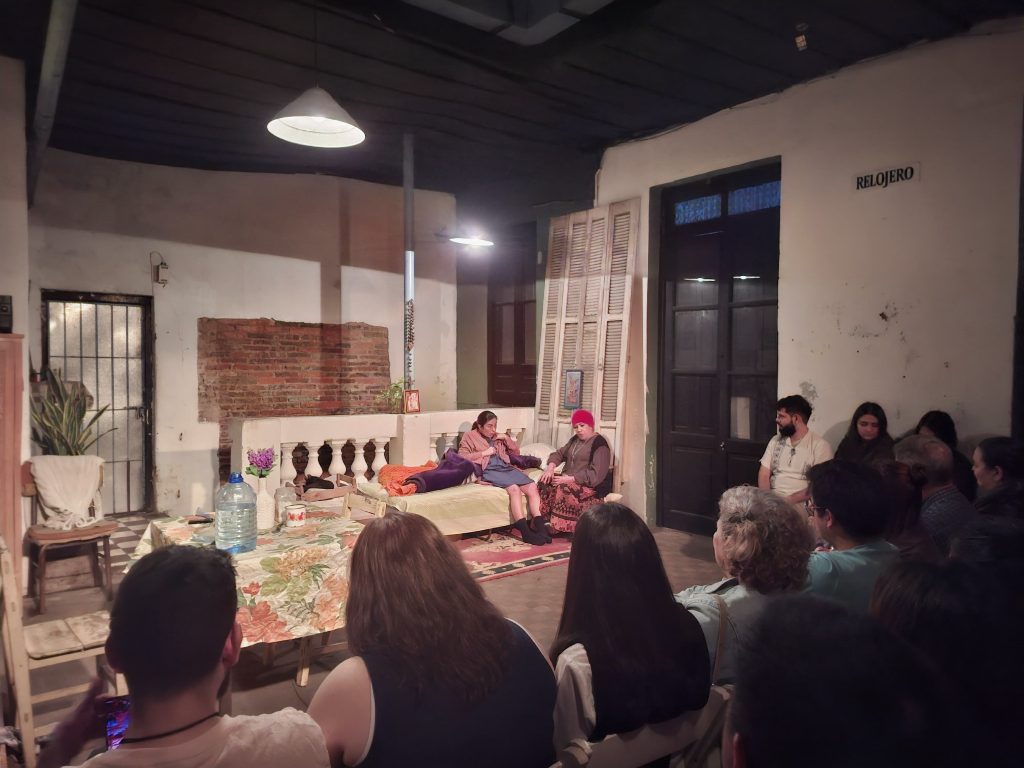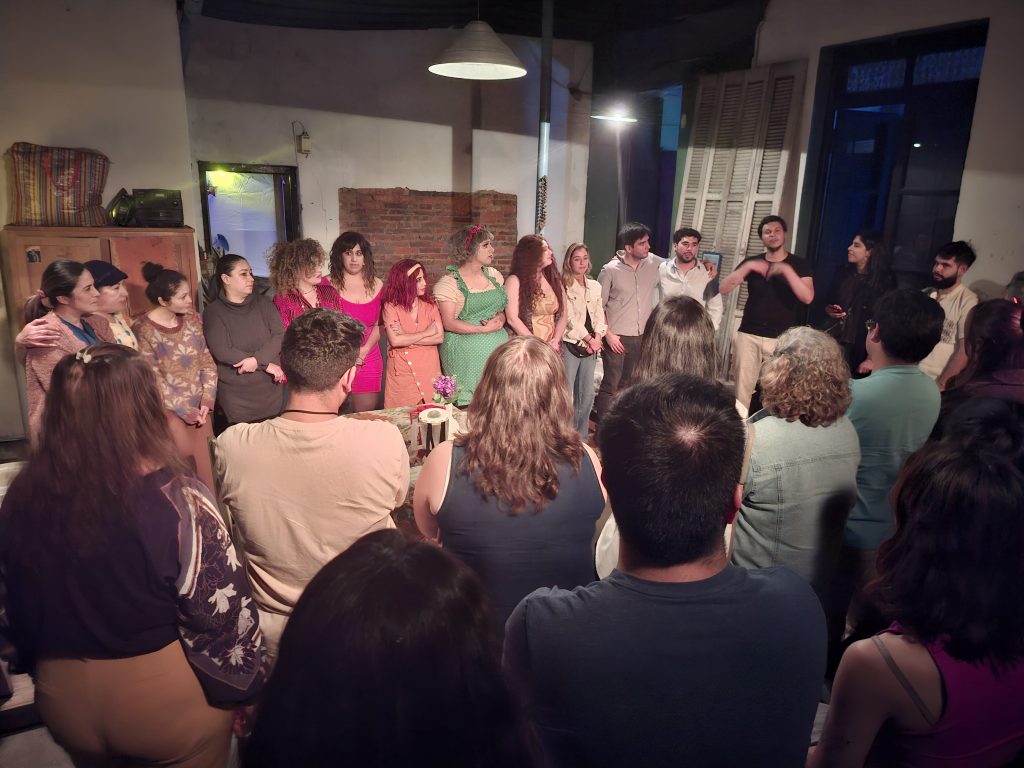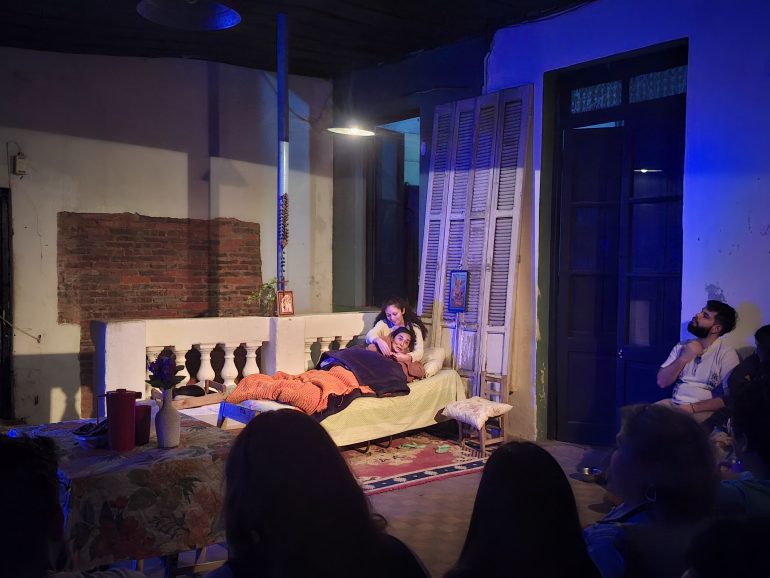When taking a Bolt, Uber, or Taxi in Paraguay, one might say there are two types of drivers. The first group would tell you that everyone in the country can understand or speak Guaraní. The second group of drivers would say that the younger generation is out of touch with Paraguay’s indigenous language. On Friday July 11 at the La Recova building in downtown Asunción, the crowd for Cambala, a price winning play in Guaraní, was younger than one might expect. It showed that also the younger generation in Paraguay cares about this beautiful language. The Asunción Times was there to see it.
Boldness of Guaraní
In a country with two official languages and plays almost exclusively in Spanish, having one in Guaraní was a bold move. A needed move. ¡Aguyje! Cambala reconnects Paraguayans with one of their languages, which was present long before the arrival of the Spaniards. The effort put in place by Rodrigo Pastore Samaniego – writer and director of the play – to re-give Guaraní to Paraguayans paid off.
The Paraguayan government recognised the effort of Rodrigo and his team. In 2025, the Ministry of Culture declared the play of “National Interest.” This status refers to the objectives and priorities that the government considers essential for its development and well-being. It encompasses political, economic, social, and cultural aspects.
In 2022, Cambala won an Edda de los Ríos award for the best short play. The Edda, or the Asunción Theatre Awards, were created to celebrate this type of art. The awards feature various categories honouring performers, directors, producers, playwrights, and artists involved in the field. The awards recognise the performing arts as a relevant, timeless art form, and a platform for advancing national and international culture.
A welcoming party
When arriving at La Recova for Cambala, you are welcomed by ladies – playing a character – who are speaking with you in Spanish, while they speak to each other mostly in Guaraní or Jopara, the language that is a mix of Guaraní and Spanish. A small San Juan including music, dance, food, beverages, and a fortune teller await the spectators before the actual presentation.
The location for the play is perfect. It is impactful. La Recova, located at the corner of Presidente Franco and Avenida Colón, dates from 1861. It means that the building witnessed everything from the Triple Alliance War, to all that followed, until now. The building saw the decline and regrowth of Guaraní usage. Today, apart from the theatre, this is an area that people – mostly foreigners – might visit to get souvenirs, before going towards the Presidential Palace for a visit.
The theatre, which has a seating capacity of around 50 people, is owned by Cambala director Rodrigo Pastore Samaniego, who is opening this intimate space to artists, to flourish.


The story of Cambala
In the heart of the Cambala neighbourhood, the lives of two sisters are entwined between poverty, routine, and hope. One is sick, blind, and unable to move; the other, a breadwinner, mother and sister. Amidst economic hardship and daily stress, the community prepares for the traditional San Juan festival. That same night, while games and music fill the streets, an event shakes the neighbourhood, showing how even in the midst of celebration, tragedy can reign.
The role of the daughter is played by Lorena Acosta, the mother is Kathia García. Then the role of the aunt is played by Lidia López, and Teresa Barriocanal is performing as the neighbour.
Lorena Acosta also wrote and performed a song during the play, which was adored by everyone. Overall, all spectators enjoyed the performance of Cambala and felt proud of their heritage being on display. They were glad the opportunity was given to them to assist to a play in Guaraní, hoping it will happen again, and more often.
Upcoming performances
While it is unclear if there will be future other plays in Guaraní, there will be at least more of Cambala. In July, the play will be presented on July 18, 19, 20, 25, 26, and 27. Then it will also be on August 1, 2, and 3. Extra dates might be added. All performances start at 8:30 PM; however, you can come past 7:30 to enjoy the mini–San Juan organised by the production.
At the moment, tickets are at Gs. 90,000 (US$12) if purchased 24 hours in advance. After that, tickets cost Gs. 100,000 (US$13). All upcoming presentations will be at La Recova.
For more information, check Cambala on Instagram. Let the good times roll! ¡Tojeroky umi momento porã!


